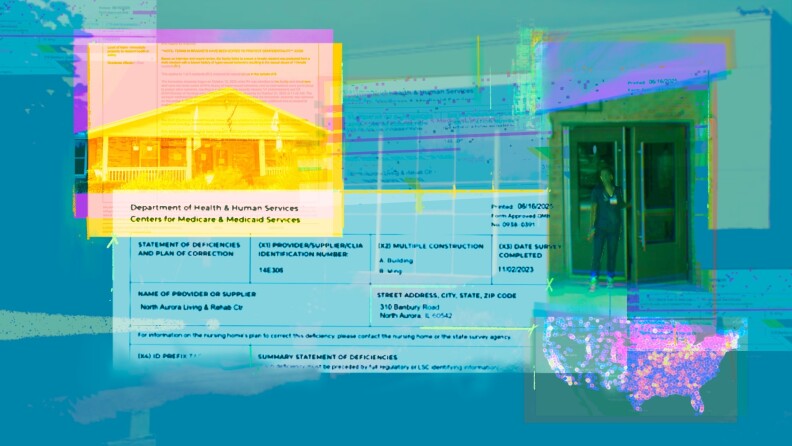
Employees at North Aurora Care Center in northern Illinois expressed concerns about admitting a resident known only as V.R. The 28-year-old man had a history of schizophrenia, hypersexual tendencies, and cognitive delay. Despite staff apprehensions, the facility’s corporate office, Petersen Health Care, overruled those concerns and admitted him in October 2023. Within 24 hours, V.R. was involved in multiple incidents of alleged abuse, raising serious questions about the ability of nursing homes to adequately care for individuals with serious mental illnesses.
The incidents reported by nursing staff included V.R. allegedly groping a resident with Down syndrome and attempting to enter the rooms of other residents. According to inspection reports, the nursing staff did not become aware of these allegations until informed by the residents the following morning. V.R. was later found not guilty of battery and abuse due to his mental condition, prompting the facility to identify him solely by his initials.
This situation at North Aurora highlights broader issues within nursing homes across the United States, particularly those housing individuals with mental health challenges. An investigation conducted by the APM Research Lab indicates that nursing homes often lack the resources necessary to provide adequate care for residents with serious mental illnesses. Research shows that upwards of 90% of residents in some facilities have diagnoses such as schizophrenia, bipolar disorder, or psychotic disorders.
The challenges faced by these facilities are exacerbated by state regulations that remain unenforced. In Illinois, a law was passed in 2010 requiring the state’s health department to establish a certification program for nursing homes admitting residents with serious mental illnesses. This certification would mandate specialized staff and training to ensure proper care. Yet, as of late 2023, there is no record of North Aurora Care Center being certified, despite approximately 70% of its residents being admitted primarily due to mental health issues. Furthermore, the Illinois Department of Public Health has not certified any nursing homes for this purpose, even though hundreds of facilities have at least one resident with a serious mental illness.
Nationally, about 1 in 5 nursing home residents, totaling around 217,000 individuals, suffers from a serious mental illness, according to data analyzed by the APM Research Lab. The pathways leading individuals with serious mental illnesses to nursing homes often begin with hospital stays, where they are discharged to facilities lacking the necessary support structures. Many patients find themselves in nursing homes due to a lack of suitable home-based services or the loss of housing during their treatment.
Research indicates that nursing homes are better equipped to address physical health needs than mental health challenges. Consequently, residents with serious mental illnesses may not receive the care they require to improve their conditions, and some may find their situations worsen in institutional settings. A troubling pattern emerges: the more residents with mental health issues a nursing home accommodates, the higher the likelihood of abuse and neglect.
In recent years, there have been high-profile cases of violence in nursing homes involving residents with serious mental illnesses. For instance, a frail resident in Kansas City, Missouri, died after being allegedly assaulted by another resident with mental health issues. In Louisiana, another resident died after being left unsupervised for hours, highlighting the potential dangers of inadequate oversight in these facilities.
Staffing levels also play a critical role in the quality of care provided. The Centers for Medicare & Medicaid Services reported that North Aurora’s nursing staff levels were below federal minimum standards in 2023. Insufficient staffing can result in inadequate supervision, leaving vulnerable residents at risk. Recent inspections have revealed multiple deficiencies at several facilities owned by Petersen Health Care, where staffing shortages have compromised care.
The financial implications of this system are significant. Taxpayers largely bear the costs through Medicare and Medicaid, while profits flow to for-profit nursing home operators. On average, Medicaid pays approximately $6,000 per month for each nursing home resident’s care. For-profit facilities that house higher proportions of residents with serious mental illnesses report more instances of abuse compared to their nonprofit or government counterparts.
The situation at North Aurora reflects a troubling trend within the nursing home industry, where corporate priorities can overshadow the well-being of residents. After V.R.’s admission, staff reported that decisions regarding admissions were increasingly made by corporate executives rather than frontline employees, who were often left in the dark about residents’ histories and needs.
In April 2025, Petersen Health Care filed for Chapter 11 bankruptcy, citing debts ranging from $100 million to $500 million. This financial instability raises further concerns about the quality of care residents can expect. Although nursing homes may offer a semblance of care for individuals with serious mental illnesses, many experts advocate for community-based alternatives that provide better outcomes.
Legislative efforts are underway to improve access to at-home care for mental health patients. U.S. Representative Daniel Goldman has introduced a bill aimed at simplifying Medicaid funding for at-home mental health services. Meanwhile, states like Massachusetts are working to enhance community-based options for individuals with disabilities, aiming to create a more supportive environment for those in need of care.
The story of V.R. and the circumstances at North Aurora Care Center serve as a reminder of the ongoing challenges in addressing the needs of individuals with serious mental illnesses in nursing homes. As states grapple with these issues, the call for reform and improved care options for vulnerable populations continues to grow.







